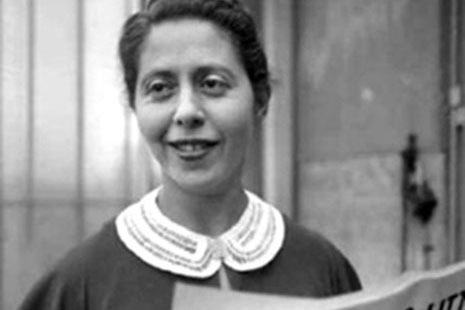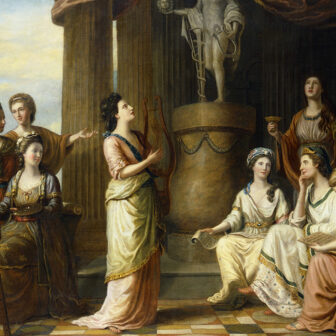The Courilof Affair
Irène Némirovsky | Vintage | $24.95
IN 2006 Irène Némirovsky’s Suite Française won a well-publicised niche in the canon of books (mostly by Russians) that have been as subject to tragedy and misadventure as their authors. Némirovsky, the daughter of a rich Jewish banking family who fled life in post-revolutionary St Petersburg to live in Paris, died in 1942 in Auschwitz, at the age of thirty-nine. She was recognised in literary circles as the author of several successful novels, but only decades later did the partly typed, partly handwritten script comprising Suite Française come to light. As is now well known, it had been miraculously saved by the elder of her two young daughters, who kept it in a suitcase until the 1970s. Also preserved were notebooks in which Némirovsky expressed her intention of writing a War and Peace in four or five volumes on the German occupation of France during the second world war. The two-volume version that survived does not approach Tolstoy’s epic; but it does address with rare insight the varying fates of a group of Parisians after the city is invaded by the Nazis and, in the second volume, life in an occupied village.
The runaway success of Suite Française (“A masterpiece… ripped from oblivion,” shrieks the cover, courtesy of Le Monde) led to a minor republishing explosion once it was realised that a whole clutch of short Némirovsky novels, or novellas, had been out of print since before her death. So far, four of these early works (the originals all being in French, although Némirovsky’s childhood language was Russian) have been translated into English.
The first, David Golder, was originally published in 1929 when the author was twenty-six, earning her instant fame. Its republication in 2007 fuelled a trans-Atlantic controversy. Némirovsky, the literary heroine and Auschwitz martyr, was accused in some quarters of being anti-Semitic, a “self-hating Jew,” with David Golder cited in evidence. Golder is the rich, Jewish father of Joyce, a beautiful, spoiled and self-obsessed eighteen-year old, who both exploits and despises the luxury and self-indulgence of her parents and their friends. Living by and for money, or what it can buy, Joyce and her mother take for granted the champagne, holidays, jewels, cars and lovers that are of course paid for by Golder, who at sixty-odd has grown heavy, tired and ill. Besotted by his daughter, he allows her to relieve him of huge sums of money.
The circles Némirovsky describes are not only unpleasant but highly stereotyped, doing little for her reputation as a writer. But Golder himself saves the novel by breaking out of the mould. Frightened by the suicide of an associate and by his own increasing heart pains, he begins to give his life some meaning, first by examining it, and then, more surprisingly, by withdrawing from it. The revelation of his slow, painful awakening and precipitous descent into loneliness and despair is deeply touching; it redeems the novel artistically while putting paid to crude political denigration.
The most recent offering by translator Sandra Smith is another short novel, The Courilof Affair, first published in 1933. Set in Russia in 1903, the year in which Némirovsky was born, it fictionalises a specific historical event, but one typical of the many terrorist acts from the 1860s onwards that were portents of the revolutions of 1905 and 1917. After the assassination of Tsar Alexander II in 1881 the regime had become increasingly oppressive and the people, especially students, correspondingly radical. In January 1901, following a wave of demonstrations, the education minister, Bogoliepov, forced 200 student leaders into the army. In February a student named Karpovich shot Bogoliepov in the neck, wounding him fatally.
Némirovsky’s novella tells the story of a student known as Léon M, the child of Russian revolutionaries, brought up in Switzerland; the education minister is called Valerian Alexandrovitch Courilof. M studies medicine, more or less, in a clinic rather than a university, and is appointed as a kind of personal nurse to the ailing Courilof. The minister, unaware of M’s Russian parentage, speaks freely in front of him while M waits for the order to kill him to come through.
Rather like Golder, Courilof, who at first appears quite repellent, is slowly humanised through familiarity and then pity – thus posing a dilemma for M. The gradual, credible softening of attitude is by far the most successful part of the novella in terms of the writing, but it comes close to the climax and more cannot be said without disclosing the plot. Unfortunately, until that point is reached, there are enough weaknesses to make one wonder whether this book would ever have been published did it not form part of the Némirovsky juvenilia (as it were), or perhaps the translator’s pot of gold.
One annoyance is that Smith has retained Némirovsky’s Frenchification of Russian names, which makes them sound unnatural to anyone used to English transliteration (Kourilov, Alexandrovich) when reading in English. Another is that although her rendering of Suite Française was pleasing, here there are grating errors such as the use of “lay” instead of “lie” and “hung” instead of “hanged.” But Smith cannot be blamed for one of Némirovsky’s own ineptitudes: an “elderly,” white-haired Jewish widow comes to plead with the minister on behalf of her denounced son. She is pathetic enough until it turns out, unbelievably, that the son is sixteen and the “old woman” the mother of three still younger children.
These quibbles may seem trivial, but they add up to a feeling of inauthenticity; and while the emergence of a Courilof as a man to be pitied rather than reviled is well done, there are many better accounts of Russian revolutionary activity in English, starting with Dostoevsky’s The Devils. The revolution, even that of 1905, was a long time acoming. •




